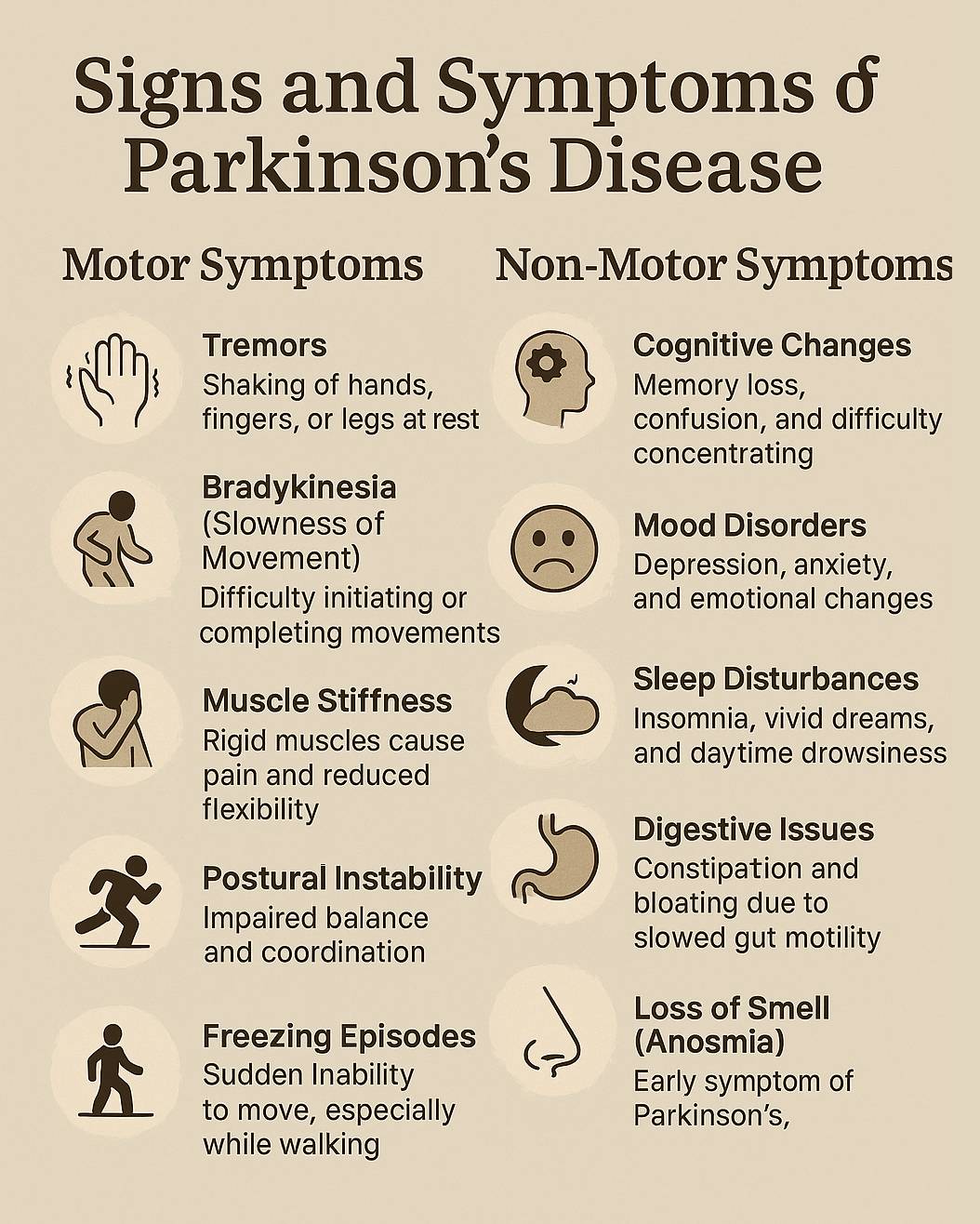What is Parkinson's Disease?
Parkinson's Disease (PD) is a progressive neurological disorder that primarily affects movement. It occurs due to the gradual loss of dopamine-producing neurons in the brain, leading to tremors, stiffness, slow movements, and balance issues.
This disorder mainly affects older adults, but early-onset Parkinson's can develop before the age of 50. While modern medicine focuses on symptom management, Ayurveda provides a holistic approach to slow disease progression and improve quality of life naturally.
Types of Parkinson's Disease
Parkinson's Disease is classified based on its causes and progression:
- The most common form, with no identifiable cause.
- Develops gradually and worsens over time.
- Occurs due to external factors such as head injury, toxins, or medication side effects.
Includes conditions that mimic Parkinson's but have additional symptoms, such as:
- Multiple System Atrophy (MSA) - Affects multiple body systems.
- Progressive Supranuclear Palsy (PSP) - Causes balance and eye movement issues.
- Corticobasal Degeneration (CBD) - Impairs coordination and cognitive function.


What Causes Parkinson's Disease?
The exact cause of Parkinson's is not fully understood, but several factors contribute to its development:
- Dopamine Deficiency - Parkinson's occurs when dopamine-producing neurons in the brain deteriorate, leading to impaired movement control.
- Genetic Factors - A family history of Parkinson's can increase the risk. Specific gene mutations are linked to early-onset Parkinson's.
- Environmental Triggers - Exposure to pesticides, heavy metals, and toxins can increase the risk. Head injuries may contribute to neuronal damage.
- Oxidative Stress & Inflammation - Chronic inflammation and oxidative stress can accelerate nerve cell degeneration.
- Gut-Brain Connection - Ayurveda and modern research suggest that poor digestion and gut health may play a role in Parkinson's progression.
Signs and Symptoms of Parkinson's Disease
Symptoms of Parkinson's develop gradually and worsen over time. They are classified into motor (movement-related) and non-motor symptoms.
- Tremors - Shaking of hands, fingers, or legs at rest.
- Bradykinesia (Slowness of Movement) - Difficulty initiating or completing movements.
- Muscle Stiffness - Rigid muscles cause pain and reduced flexibility.
- Postural Instability - Impaired balance and coordination.
- Freezing Episodes - Sudden inability to move, especially while walking.
- Cognitive Changes - Memory loss, confusion, and difficulty concentrating.
- Mood Disorders - Depression, anxiety, and emotional changes.
- Sleep Disturbances - Insomnia, vivid dreams, and daytime drowsiness.
- Digestive Issues - Constipation and bloating due to slowed gut motility.
- Loss of Smell (Anosmia) - Early symptom of Parkinson's.

When to See a Doctor?
If you experience persistent tremors, stiffness, or movement difficulties, consult a neurologist or an Ayurvedic specialist for early diagnosis and treatment.
Ayurvedic Treatment for Parkinson's Disease
In Ayurveda, Parkinson's Disease is referred to as Kampavata, caused by an imbalance in Vata dosha. Ayurvedic treatment aims to balance Vata, strengthen the nervous system, and improve brain function through herbal remedies, therapies, and lifestyle modifications.
- Mucuna Pruriens (Kapikacchu) - Natural source of L-Dopa, which boosts dopamine levels.
- Ashwagandha - Reduces stress, improves nerve function, and strengthens muscles.
- Brahmi - Enhances cognitive function and memory.
- Guggulu - Helps reduce inflammation and detoxifies the body.
- Shankhpushpi - Improves focus and mental clarity.
Ayurveda recommends Panchakarma therapies to remove toxins and rejuvenate the nervous system:
- Abhyanga (Oil Massage) - Warm medicated oils reduce muscle stiffness.
- Shirodhara (Oil Dripping Therapy) - Herbal oil poured over the forehead calms the nervous system.
- Nasya (Nasal Therapy) - Herbal oils clear toxins from the brain and enhance mental clarity.
- Basti (Medicated Enema) - Balances Vata and improves gut health.
- Include: Warm, nourishing foods like ghee, nuts, whole grains, and cooked vegetables.
- Avoid: Cold, dry, and processed foods that aggravate Vata.
- Drink Herbal Teas: Brahmi, Ashwagandha, and ginger tea promote brain health.
- Use Healthy Oils: Coconut and sesame oil support nervous system function.
- Practice Yoga & Meditation - Helps improve balance, flexibility, and mental calmness.
- Daily Routine (Dinacharya) - Maintaining a regular sleep and meal schedule balances Vata.
- Gentle Exercise - Walking, Tai Chi, and light stretching improve mobility.
- Stress Management - Avoid excessive worry and practice breathing exercises (Pranayama).
Frequently Asked Questions (FAQs)
Ayurveda focuses on managing symptoms and slowing disease progression rather than offering a complete cure. Consistent Ayurvedic treatment can improve mobility, reduce tremors, and enhance overall well-being.
In most cases, Parkinson's is not inherited, but genetic factors can increase susceptibility.
Yes, Ayurveda emphasizes a Vata-pacifying diet that includes warm, nourishing foods to support nerve health.
Yes, stress can trigger and worsen symptoms. Ayurvedic therapies, yoga, and meditation help in stress management.
Mahanarayan Oil and Bala Taila are commonly used in Ayurvedic massages to relieve stiffness and tremors.
Yes, poor digestion and gut-brain axis dysfunction can contribute to Parkinson's symptoms. Ayurvedic herbs and Panchakarma help improve digestion and detoxification.
Panchakarma therapies like Shirodhara, Nasya, and Basti help in detoxifying the body, calming the nervous system, and improving mobility.
Conclusion
Parkinson's Disease is a progressive neurological condition that can be effectively managed with Ayurveda. By balancing Vata dosha, detoxifying the body, and using herbal remedies, Ayurveda offers a natural and holistic approach to improving mobility, reducing tremors, and enhancing brain function. If you or a loved one are experiencing symptoms of Parkinson's, consult an Ayurvedic expert for personalized treatment.
